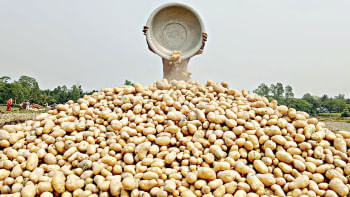646 tonnes of plastic waste produced in Dhaka every day
Dhaka city produces 646 tonnes of plastic waste every single day, which is 468 tonnes more than 15 years back in the capital, World Bank Country Director for Bangladesh and Bhutan Mercy Tembon said at a programme yesterday.
"In Dhaka city alone, plastic waste has gone up from 178 tonnes per day in 2005 to 646 tonnes per day in 2020," she said while addressing a workshop on "Sustainable Management of Plastic to Leverage Circular Economy and Achieve SDG in Bangladesh".
She also said addressing plastic pollution is a critical development agenda for ensuring green and smart growth.
The World Bank in association with the Department of Environment (DoE) and the Ministry of Environment, Forest and Climate Change organised the virtual programme as a part of the series of events. This was the fourth event in the series.
The World Bank yesterday also awarded four winning teams of a competition titled "Plastic Circularity Innovation Challenge", for bringing ideas of innovative solutions to combat plastic pollution in Bangladesh.
The contest was arranged for innovative solutions in two categories – collection or sorting, recycling of low-valued plastics and single-use plastics; and digital technology solutions in coping with plastic pollution such as smartphone apps.
The three-member panel of judges included Ahsan Khan Chowdhury, chairman and CEO of Pran-RFL; Cyrill Gutsch, CEO, Parley for the Oceans; and Marina Tabassum, founder and principal architect of Marina Tabassum Architects. The short-listed teams made presentations virtually in presence of the judges.
Ziaul Hasan, secretary of the Ministry of Environment, Forest, and Climate Change, said the Bangladesh government is committed to reduce pollution and ensure sustainable green growth.
The contest was launched in November 2020 and funded by PROBLUE, is an umbrella multi-donor trust fund, administered by the World Bank. The winners received Tk 80,000.
THE WINNERS AND WINNING PROPOSALS
Team Amity -- formed by Buet students Farhana Haque and Sadman Fakid, came up with the idea of integrated management of plastic wastes where they present a micro-credit business model addressing unemployment and involving a multi-modal approach to plastic waste collection, sorting and recycling.
Team Blues -- comprising Mahedy Hasan, Sakib Asrar, and Tanvirul Azim from North South University -- built a budget-friendly floating-aquatic-waste-cleaning robot made of readily available cheap materials and with minimal labor. This bot is made of floatable material that will hover on the water to collect the waste materials resulting in cleaning our water bodies.
Team Garbageman -- founded by Fahim Uddin Shuvo -- presented a 'Recycling Platform,' a free incentive-based digital way for environmentally conscious individuals, households, restaurants, and organisations who will donate recyclable waste for recycling and upcycling purpose. The platform, Garbageman Ltd, will formalise the supply chain of recyclables and create opportunities for green jobs, and conduct research and development to create scope to recycle and upcycle waste.
Team Green Beans -- comprising Mohammad Rayed and Asma Arisham, students of North South University; and Mahdi Ahmed from Bangladesh University of Professionals (BUP), came up with the model 'Bottle Economy,' a platform using USSD, a decade-old mobile communication protocol to connect poor people and scavengers with local recyclers, allowing them to sell plastic wastes directly while limiting the role of intermediaries. It encourages them to recycle plastics by providing monetary incentives.

 For all latest news, follow The Daily Star's Google News channel.
For all latest news, follow The Daily Star's Google News channel. 



Comments